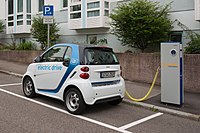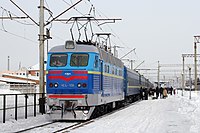Related Research Articles

The Brazilian Highway System is a network of trunk roads administrated by the Ministry of Infrastructure of Brazil (MINFRA). It is constructed, managed and maintained by the National Department of Transport Infrastructure (DNIT), federal agency linked to the Ministry of Infrastructure, and the public works departments of state governments.

Brazilian industry has its earliest origin in workshops dating from the beginning of the 19th century. Most of the country's industrial establishments appeared in the Brazilian southeast, and, according to the Commerce, Agriculture, Factories and Navigation Joint, 77 establishments registered between 1808 and 1840 were classified as "factories" or "manufacturers". However, most, about 56 establishments, would be considered workshops by today's standards, directed toward the production of soap and tallow candles, snuff, spinning and weaving, foods, melting of iron and metals, wool and silk, amongst others. They used both slaves and free laborers.

The 2009 swine flu pandemic in Brazil began on April 25, 2009, with two people, spreading to 34 over the first two weeks. CDC calculate that Africa and Southeast Asia, which have 38% of the world's population, accounted for a disproportionate 51% of the deaths.

The Brazilian automotive industry is coordinated by the Associação Nacional dos Fabricantes de Veículos Automotores (Anfavea), created in 1956, which includes automakers with factories in Brazil. Anfavea is part of the Organisation Internationale des Constructeurs d'Automobiles (OICA), based in Paris. In 2021, the annual production exceeded 2.2 million vehicles, the 8th largest in the world.

Olavo Luiz Pimentel de Carvalho was a Brazilian polemicist, self-proclaimed philosopher, political pundit, former astrologer, journalist, and far-right conspiracy theorist. From 2005 until his death, he lived near Richmond, Virginia, in the United States.

Investimentos e Participações em Infraestrutura S.A.- Invepar, or Invepar S.A., is a private urban mobility and transit infrastructure management company headquartered in Rio de Janeiro, RJ, Brazil. The company holds 11 concessions through its subsidiary companies and joint ventures in the toll roads, airports and urban mobility segments.

Rodízio veicular, or vehicle restriction, is a restriction on traffic in São Paulo, Brazil, during peak travel times. It is based on the last digit of the vehicle's number plate. São Paulo is the largest metropolis in the world with a permanent alternate-day travel restriction. The scheme was first implemented in 1995 as a trial on a voluntary basis, and then as a mandatory restriction implemented in August 1996 to mitigate air pollution, and thereafter made permanent in June 1997 to relieve traffic congestion. The driving restriction applies to passenger cars and commercial vehicles, and it is based on the last digit of the licence plate. Two numbers are restricted to travel every day between 7 a.m. to 10 a.m. and 5 p.m. to 8 p.m. from Monday through Friday.
In Brazilian football, G-12 refers to a group of twelve clubs: Atlético Mineiro, Botafogo, Corinthians, Cruzeiro, Flamengo, Fluminense, Grêmio, Internacional, Palmeiras, Santos, São Paulo and Vasco da Gama. They are considered to be the most popular and successful sides in Brazilian football, having won all but six editions of the Brasileirão between them since the inception of the tournament.
The Case Evaldo Rosa, also known as the Case of the 80 gunshots, refers to the homicide of musician Evaldo Rosa dos Santos and recyclable material collector Luciano Macedo, which occurred on April 7, 2019, in the city of Rio de Janeiro. At 2:40 pm (BRT), Evaldo was driving a Ford Ka with five occupants down Camboatá Road when Brazilian Army soldiers opened fire. Evaldo was shot and died on the spot. Passenger Sérgio Gonçalves was wounded and Luciano, who was passing by and tried to help, was also shot and died eleven days later. The occupants of the vehicle and witnesses stated that the soldiers started firing abruptly, from behind, without any previous signaling or warning, and did not stop firing even after the musician's pregnant wife and son left the car. According to the Judicial Military Police, the military fired 257 rifle shots. 62 pierced the car.
Miss Brazil CNB 2018 was the 29th edition of the Miss Brazil CNB pageant and the 4th under CNB Miss Brazil. The contest took place on August 11, 2018. Each state, the Federal District and various Insular Regions & Cities competed for the title. Gabrielle Vilela of Rio de Janeiro crowned her successor, Jéssica Carvalho of Piauí at the end of the contest. Carvalho represented Brazil at Miss World 2018. The contest was held at the Hotel do Bosque in Angra dos Reis, Rio de Janeiro, Brazil.

Events in the year 2022 in Brazil.
Miss Brazil World 2016 was the 27th edition of the Miss Brazil World pageant and the 2nd under CNB Miss Brazil. The contest took place on June 25, 2016. Each state, the Federal District and various Insular Regions & Cities competed for the title. Catharina Choi of Ilhabela crowned her successor, Beatrice Fontoura of Goiás at the end of the contest. Fontoura represented Brazil at Miss World 2016. The contest was held at the Resort Il Campanario in Florianópolis, Santa Catarina, Brazil.
Miss Brazil World 2013 was the 24th edition of the Miss Brazil World pageant and 8th under MMB Productions & Events. The contest took place on April 6, 2013. Each state, the Federal District and various Insular Regions & Cities competed for the title. Mariana Notarângelo of Rio de Janeiro crowned Sancler Frantz of Ilha dos Lobos at the end of the contest. Frantz represented Brazil at Miss World 2013. The contest was held at the Portobello Resort & Safari in Mangaratiba, Rio de Janeiro, Brazil.
The São Paulo ePrix is a race of the single-seater, electrically powered Formula E championship, set to be held for the first time in São Paulo, Brazil in March 25, 2023.
Miss Brazil World 2009 was the 20th edition of the Miss Brazil World pageant and 4th under MMB Productions & Events. The contest took place on July 4, 2009. Each state, the Federal District and various Insular Regions competed for the title. Tamara Almeida of Minas Gerais crowned Luciana Reis of Roraima at the end of the contest. Bertolini represented Brazil at Miss World 2009. The contest was held at the Hotel do Frade in Angra dos Reis, Rio de Janeiro, Brazil.
Miss Brazil World 2012 was the 23rd edition of the Miss Brazil World pageant and 7th under MMB Productions & Events. The contest took place on April 2, 2012. Representatives from various cities all throughout Brazil competed for the Brazilian crown for Miss World. Juceila Bueno of Rio Grande do Sul crowned Mariana Notarângelo of Rio de Janeiro at the end of the contest. Notarângelo represented Brazil at Miss World 2012. The contest was held at the Rede Pampa Studios in Porto Alegre, Rio Grande do Sul, Brazil.

Fábrica Nacional de Mobilidades, shortened FNM Elétricos, is a Brazilian automotive manufacturer headquartered in the city of Rio de Janeiro. FNM produces electric trucks in Caxias do Sul, in Rio Grande do Sul.

Miss Brazil 2009 was the 55th edition of the Miss Brazil pageant. It was held on 9 May 2009 at the Latin American Memorial Complex in São Paulo, São Paulo State, Brazil and was hosted by Nayla Micherif and Renata Fan. Natálya Anderle of Rio Grande do Sul crowned her successor Larissa Costa of Rio Grande do Norte at the end of the event. Costa represented Brazil at the Miss Universe 2009 pageant. 1st Runner-Up, Rayanne Morais of Minas Gerais represented the country at Miss International 2009.
Miss Brazil 2008 was the 54th edition of the Miss Brazil pageant. It was held on 13 April 2008 at Citibank Hall in São Paulo, São Paulo State, Brazil and was hosted by Nayla Micherif and Guilherme Arruda with Renata Fan as a commentator. Natália Guimarães of Minas Gerais crowned her successor Natálya Anderle of Rio Grande do Sul at the end of the event. Anderle represented Brazil at the Miss Universe 2008 pageant. 1st Runner-Up, Vanessa Vidal of Ceará represented the country at Miss International 2008.

The 2022 Brazilian election protests began shortly after the conclusion of the 2022 Brazilian general election's second round on October 30, in which Luiz Inácio Lula da Silva was elected president. Supporters of Jair Bolsonaro, the outgoing incumbent president, started blocking roads and highways in the country. At least 23 Brazilian states, plus the Federal District, recorded roadblocks as of 1 November, adding up to at least 267 roadblocks according to data from Federal Highway Police (PRF).
References
- ↑ Peroni, Jady (19 August 2022). "Brasil terá 5,5 milhões de carros elétricos na frota em 2035, aponta estudo". Jornal do Carro (in Portuguese). Retrieved 5 November 2022.
- ↑ Quintanilha, Sergio (28 October 2022). "Lula eleito pode mudar futuro dos carros elétricos no Brasil". Terra (in Portuguese). Retrieved 26 November 2022.
- ↑ Gama, Paula (21 October 2022). "Carro elétrico vira realidade no Brasil, e as filas em eletropostos também" (in Portuguese). UOL. Retrieved 5 November 2022.
- ↑ "Brasil: maioria dos consumidores tem interesse no carro elétrico ou híbrido". InsideEVs (in Portuguese). 25 October 2022. Retrieved 5 November 2022.
- 1 2 Viana, Emilly (19 November 2022). "Definidas cidades de Goiás que devem ganhar pontos de recarga para carros elétricos". Portal 6. Retrieved 26 November 2022.
- 1 2 de Magalhães, Estéfane (20 November 2022). "Dirigindo ao futuro: número de carros elétricos aumentam no RJ". Diário do Rio (in Portuguese). Retrieved 26 November 2022.
- ↑ "São Paulo já tem mais de 400 carregadores para veículos elétricos". InsideEVs (in Portuguese). 17 August 2022. Retrieved 27 November 2022.

